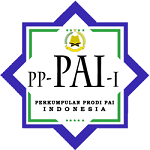The Effect of Islamic Group Guidance on Student Self Efficacy
Abstract
This research is motivated by the phenomenon that there are still many students at MTsN 6 Agam who are indicated to have low Self-Efficacy in dealing with learning situations. The aim to be achieved in this research is to find out whether there is an influence of Islamic group guidance on student Self-Efficacy at MTsN 6 Agam. The formulation of the problem in this research is whether the Islamic Group Guidance technique has a significant influence on the Self-Efficacy of class VII-8 students at MTsN 6 Agam. This type of research is pre-experimental research with a One Group Pretest Posttest Design model. The population is class VII students at MTsN 6 Agam, while the research sample is 10 students who have indicated Self-Efficacy problems based on a non-random sampling technique in the form of purposive sampling and the results of the pretest. Data collection in this research used a questionnaire. The data analysis technique uses the Wilcoxon test which requires the hypothesis to be accepted if the sig value is less than 0.05 and is assisted by the SPSS version 26 application. Based on the results of data analysis using the Wilcoxon test, the sig value is known. p-value is 0.005< ɑ (ɑ = 0.05) which means Ha is accepted and Ho is rejected. The results of the Wilcoxon test calculations can be concluded that Islamic group guidance can be an alternative for increasing student Self-Efficacy in class VII-8 MTsN 6 Agam.
Keywords
Full Text:
PDFReferences
Ahmad, Zulkifley Mohamed, dan F. E. Subekti. 2021. “Implementation of Problem Based Learning in Basic Statistical Concepts Using Web-Based Apps.” International Journal of Management and Humanities 5(12):1–5. doi: 10.35940/ijmh.L1360.0851221.
Alek. 2016. Classroom Action Research Dalam Pendidikan Bahasa: Teori Desain Praktik.
Jakarta: UIN Jakarta Press.
Aliyudin, Bagas Satrio. 2022. “Efektivitas Media Projected Motion Pada Maharah Kalam Dan Penguasaan Mufrodat Pembelajaran Bahasa Arab.” UIN K.H Abdurrahman Wahid Pekalongan.
Anupan, Anuchit. 2020. “A Framework of Knowledge Management in Classroom Action Research on Cloud Computing for Pre-Service Teachers.” Hlm. 1–4 dalam 2020 18th International Conference on ICT and Knowledge Engineering (ICT&KE).
Darise, Gina Nurvina. 2021. “Pendidikan Agama Islam Dalam Konteks ‘Merdeka Belajar.’” Journal of Islamic Education : The Teacher of Civilization 2(2). doi: 10.30984/jpai.v2i2.1762.
Firmansyah, Mokh Iman. 2019. “Pendidikan Agama Islam : Pengertian, Tujuan, Dasar, dan Fungsi.” Taklim : Jurnal Pendidikan Agama Islam 17(2):79–90.
Masykur, Mohammad Rizqillah. 2019. “Metodologi Pembelajaran Fikih.” Al-Makrifat: Jurnal Kajian Islam 4(2):31–44.
Mu’allimin, dan Rahmat Arofah Hari Cahyadi. 2014. Penelitian TIndakan Kelasa: Teori dan Praktik. Yogyakarta: Ganding Pustaka.
Nasir, Tatang Muh, Irawan Irawan, Rika Siti Karimah, dan Wilam Nafilah Robaeah. 2023. “Penerapan Metode Pembelajaran Problem Based Learning Untuk Meningkatkan Hasil Belajar Pendidikan Agama Islam Di SMPN 1 Kadipaten.” MANAZHIM 5(1):261–77. doi:10.36088/manazhim.v5i1.2903.
Nurfajriah, Najwa, Imam Tabroni, Nursyifa Faujiah, Ridha Nurjannah, dan Tiara Putri. 2022. “Problem Based Learning (PBL): Concrete Steps to Improve Students’
Communication Skills.” International Journal of Integrative Sciences 1(1):7–20. doi: 10.55927/ijis.v1i1.2973.
Pertiwi, Alfina Bakti, dan Erwin Rahayu Saputra. 2022. “Projected Motion Sebagai Media Pembelajaran IPA SD Materi Pentingnya Upaya Pelestarian SDA Di Lingkungan.” Indonesian Journal of Educational Science (IJES) 5(1):37–43. doi: 10.31605/ijes.v5i1.1337.
Prisiska, Prilli, dan Syahril Furqany. 2021. “Upaya Membangkitkan Motivasi Belajar Pendidikan Agama Islam Tingkat Anak-Anak Pada Masa Covid-19 Di Gampong Jeulingke Dengan Penerapan Komunikasi Persuasif.” Jurnal Riset Dan Pengabdian Masyarakat 1(2):210–25. doi: 10.22373/jrpm.v1i2.1084.
Salim, Isran Rasyid Karo-karo, dan Haidir. 2015. Penelitian Tindakan Kelas: Teori dan Aplikasi Bagi Mahasiswa, Guru Mata Pelajaran Umum dan Pendidikan Agama Islam di Sekolah. Medan: Perdana Publishing.
Surur, Miftahus, dan Tartilla Tartilla. 2019. “Pengaruh Problem Based Learning Dan Motivasi Berprestasi Terhadap Kemampuan Pemecahan Masalah.” Indonesian Journal of Learning Education and Counseling 1(2). doi: 10.31960/ijolec.v1i2.96.
Suyoto, Egar Ngasbun, dan Siswanto. 2019. “P3T (Training, Guidance And Integrated Assistance) Metode-Based On Assesment Necesiity To Create Ptk (Class Action Research) Article Results For Elementary School Teachers.” The European Journal of Humanities and Social Sciences (6):54–65. doi: 10.29013/EJHSS-20-6-54-65.
Shoimin, Aris. 2014. Metode Pembelajaran Inovatif dalam Kurikulum 2013. Yogyakarta: Ar- Ruzz Media.
Syathori, A. 2017. “Kurikulum 2013 Mata Pelajaran Fikih Di Madrasah Tsanawiyah (Implementasi, Analisis Dan Pengembangannya).” Al-Tarbawi Al-Haditsah: Jurnal Pendidikan Islam 2(1). DOI:10.24235/tarbawi.v2i1.2024.
Yiu, Nicole S. N., Zhishan Su, Changwei Hu, Tiffany M. W. Mak, dan Daniel C. W. Tsang. 2021. “Problem-Based Learning: Enhancement of Students’ Learning Experience and Professional Development in a Study Tour.” Scienceweb Publishing.
Yusuf, Munir. 2018. Pengantar Ilmu Pendidikan. Palopo: Lembaga Penerbit Kampus IAIN Palopo.
Zubaidillah, Muh Haris, dan M. Ahim Sulthan Nuruddaroini. 2019. “Analisis Karakteristik Materi Pelajaran Pendidikan Agama Islam Di Jenjang SD, SMP Dan SMA.” ADDABANA: Jurnal Pendidikan Agama Islam 2(1):1–11. doi: 10.47732/adb.v2i1.95.
DOI: https://doi.org/10.24952/fahmina.v1i1.9402
Refbacks
- There are currently no refbacks.
Copyright (c) 2023 Lanna Sary Rangkuty, Alfi Rahmi, Fadhilla Yusri, Hidayani Syam

This work is licensed under a Creative Commons Attribution-ShareAlike 4.0 International License.
Index By
Editorial Office:
Pascasarjana UIN Syekh Ali Hasan Ahmad Addary Padangsidimpuan; Jl. T. Rizal Nurdin Km. 4,5 Sihitang 22733 Padangsidimpuan, North Sumatera, Indonesian.Phone: (+62) 634 22080 Faximili: (+62) 634 24022 email: fahmina@uinsyahada.ac.id

This work is licensed under a Creative Commons Attribution-ShareAlike 4.0 International License.











